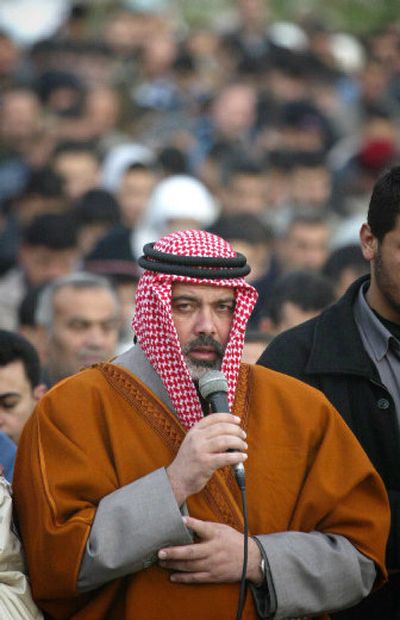Democracy push benefits Islamists

WASHINGTON – Call it a case of why you should be careful what you wish for.
President Bush’s efforts to spread democracy to the Middle East have strengthened Islamists across the region, posing fresh challenges for the United States, according to U.S. officials, foreign diplomats and democracy experts.
Islamist parties trounced secular opponents in recent elections in Iraq and Egypt.
Hamas, the armed Islamic Palestinian group, appears set to fare well in Palestinian parliamentary elections Jan. 25, posing a quandary for how the United States and Israel pursue peace efforts. Hamas has carried out suicide bombings against Israel and calls for the country’s destruction.
In Lebanon, the Shiite Muslim militia Hezbollah is part of the government for the first time.
Washington considers Hezbollah and Hamas, both of which have Iranian support, to be terrorist groups.
“In the short run, the big windfall winners … have been the Islamists,” said Michael McFaul, a Stanford University expert on democracy and development.
In the long run, democracy probably will lead to a more stable, economically flourishing Middle East, McFaul recently told a Washington conference. But he added: “We’re taking a chance.”
Islamist groups espouse Islam as the answer to their countries’ problems. They appeal to large segments of Arab societies, particularly when the only alternative is the repressive state apparatus. They’ve proved adept at providing social services that governments often don’t, and they’re largely free of the financial corruption that plagues many Arab countries.
Most strongly oppose U.S. foreign policy in the region and don’t acknowledge Israel’s right to exist. Their long-term commitment to the give-and-take of the democratic process is largely untested.
Bush administration officials and many pro-democracy advocates argue that Islamist politicians inevitably will become more moderate once they’re given the responsibilities of power. That hasn’t happened, however, in Iran, which is Shiite but not Arab.
“It’s entirely possible. But I think it’s going to be a bumpy ride,” said F. Gregory Gause III, the director of Middle East studies at the University of Vermont.
Bush used his second inaugural address a year ago Jan. 20 to make spreading democracy, particularly in the Islamic world, the priority of U.S. foreign policy. The ultimate goal, he declared, is “ending tyranny in our world.”
The United States is spending roughly $1.3 billion in fiscal year 2006 to promote democracy worldwide, the president said last May.
He argues that democracy will reduce the threat from terrorism. Some political scientists, including Gause, disagree.
Even Bush’s critics give him credit for convincing Arab regimes that Washington is serious about democracy and for encouraging a tide of relative openness from North Africa to the Persian Gulf. Pushing democracy is slowly becoming entrenched as a priority at the State Department under Condoleezza Rice and at other agencies, officials said.
But the successes are far more modest than the White House has described them, some said.
“Freedom is crawling – over broken glass,” said a State Department official, scaling back the president’s frequent contention that “Freedom is on the march.” The official requested anonymity in order to speak more frankly.
Bush and Rice rarely discuss in public the prospect that Islamists could be the prime beneficiaries of their policies.
Last spring there were elections in Iraq and the Palestinian Authority; Egyptian President Hosni Mubarak allowed multiparty presidential elections for the first time; and Syria withdrew its troops from Lebanon under international and local pressure, leading to new polls there.
But a more sober mood has set in.
“People were overly optimistic,” said former State Department official Jon Alterman, the director of the Middle East Program at the Washington-based Center for Strategic and International Studies, a national-security research center. “And now people are overly pessimistic.”
Repression and one-man rule remain the norm.